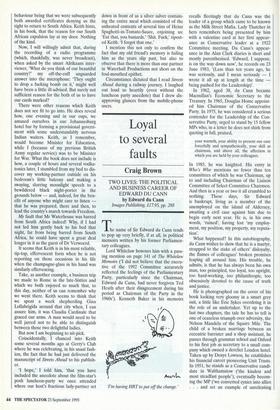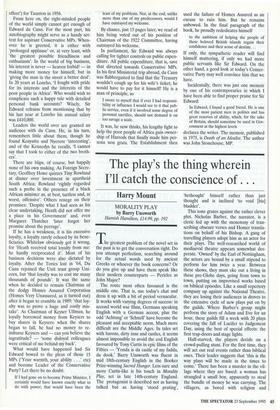Loyal to several faults
Craig Brown
TWO LIVES: THE POLITICAL AND BUSINESS CAREER OF EDWARD DU CANN by Edward du Cann
Images Publishing, £17.95, pp. 288
The name of Sir Edward du Cann tends to pop up very briefly, if at all, in political memoirs written by his former Parliamen- tary colleagues.
Lord Whitelaw honours him with a pass- ing mention on page 141 of The Whitelaw Memoirs CI did not believe that the execu- tive of the 1992 Committee accurately reflected the feelings of the Parliamentary Party, particularly since the Chairman, Edward du Cann, had never forgiven Ted Heath after their disagreement during his period as Chairman of the Party in the 1960s'). Kenneth Baker in his memoirs
'I'm having HRT to put off the change.'
recalls fleetingly that du Cann was the leader of a group which came to be known as the Milk Street Mafia. Lady Thatcher in hers remembers being presented by him with a valentine card at her first appear- ance as Conservative leader at a 1922 Committee meeting. Du Cann's appear- ance in the Alan Clark diaries is short and mostly parenthesised. 'Edward, I. suppose, is on the way down now', he records on 23 June 1983, `(Less than ten years ago, he was seriously, and I mean seriously — I wrote it all up at length at the time being pushed for the Leadership)'.
In 1962, aged 38, du Cann became Macmillan's Economic Secretary to the Treasury. In 1965, Douglas Home appoint- ed him Chairman of the Conservative Party. In 1975, he was considered a serious contender for the Leadership of the Con- servative Party, urged to stand by 15 fellow MPs who, in a letter he does not shirk from quoting in full, praised, your warmth, your ability to present our case forcefully and sympathetically, your skill as chairman, and above all, the affection in which you are held by your colleagues.
In 1985, he was knighted. His entry in Who's Who mentions no fewer than ten committees of which he was Chairman, up to and including Chairman of the Liaison Committee of Select Committee Chairmen. And then in a year or two it all crumbled to nothing. These days, Sir Edward is bankrupt, living as a member of the unemployed on the island of Alderney, awaiting a civil case against him due to begin early next year. He is, in his own words, 'ruined', having lost 'my employ- ment, my position, my property, my reputa- tion'.
What happened? In this autobiography, du Cann wishes to show that he is a martyr, strapped to the stake of others' disloyalty, the flames of colleagues' broken promises leaping all around him. His trouble, he admits, is that he has always been his own man, too principled, too loyal, too upright, too hard-working, too philanthropic, too obsessively devoted to the cause of truth and justice.
He is photographed on the cover of his book looking very gloomy in a smart grey suit, a little like Eric Sykes overdoing it in the role of an undertaker. Yet up to the last two chapters, the tale he has to tell is one of ceaseless triumph over adversity, the Nelson Mandela of the Square Mile. The child of a broken marriage between an eccentric barrister and a shop assistant, he passes through grammar school and Oxford to his first job as secretary to a small com- pany which owned a derelict London hotel.
Taken up by Denys Lowson, he establishes his financial career pioneering Unit Trusts.
In 1951, he stands as a Conservative candi- date in Walthamstow (`the kindest and most steadfast people'), eventually becom- ing the MP ('we converted cynics into allies . . . and set an example of unrelenting effort') for Taunton in 1956.
From here on, the right-minded people of the world simply cannot get enough of Edward du Cann. For the most part, his autobiography might serve as a handy set- text for aspirant Conservative MPs. When- ever he is greeted, it is either with `prolonged applause' or, at very least, with `the greatest possible friendliness and enthusiasm'. In the world of big business, his interest is never — heaven forbid! — in making more money for himself, but in `giving the man in the street a better deal'. In 20 years at Lonrho, 'I fought with pride for its interests and the interests of the poor people in Africa'. Who would wish to complicate such a happy tale with detailed personal bank accounts? Wisely, Sir Edward refrains from mentioning that by his last year at Lonrho his annual salary was £410,000.
Leaders the world over are granted an audience with du Cann. He, in his turn, remembers little about them, though he found Kenyatta and Nyerere 'interesting', and of the Kennedys he recalls, 'I cannot say that I took to either of the two broth- ers'.
There are blips, of course, but happily none of his own making. As Foreign Secre- tary, Geoffrey Howe quizzes Tiny Rowland at dinner over investment in apartheid South Africa; Rowland 'rightly regarded such a probe in the presence of a black African minister as, at best, tactless and, at worst, offensive'. Others renege on their promises: 'Despite what I had seen as his clear undertaking, Heath did not offer me a place in his Government' and, even Margaret Thatcher 'later forgot her promise about the peerage'. If he has a weakness, it is his excessive loyalty, a loyalty rarely echoed by its bene- ficiaries. Whitelaw obviously got it wrong, for 'Heath received total loyalty from me: he hardly reciprocated it'. Most of his business decisions were also dictated by loyalty. After the Tories lost in '64, Du Cann rejoined the Unit trust group Uni- corn, but 'that loyalty was to cost me many thousands of pounds'. It was the same when he decided to remain Chairman of the dodgy Homes Assured Corporation (Homes Very Unassured, as it turned out) after it began to crumble in 1989: 'that loy- alty was to prove a huge and costly mis- take'. As Chairman of Keyser Ullman, he loyally borrowed money from Keysers to buy shares in Keysers: when the shares began to fall, he had no money to re- imburse Keysers and — can you believe the ingratitude? — 'some disloyal colleagues were critical of me behind my back'.
What would have happened had Sir Edward bowed to the pleas of those 15 MPs (`Your warmth, your ability . . .' etc) and become Leader of the Conservative Party? Let there be no doubt: If I had gone on to become Prime Minister, I certainly would have known exactly what to do with power; that would have been the least of my problems. Nor, at the end, unlike more than one of my predecessors, would I have outstayed my welcome.
By chance, just 15 pages later, we read of him being voted out of his position of Chairman of the 1922 Committee, having outstayed his welcome.
In parliament, Sir Edward was always calling for tighter controls on public expen- diture. All public expenditure, that is, save that directed towards Conservative MPs. In his first Ministerial trip abroad, du Cann was flabbergasted to find that the Treasury wouldn't cough up for his wife's ticket; he would have to pay for it himself! He is a man of principle, so I swore to myself that if ever I had responsi- bility or influence I would see to it that pub- lic service, even if it involved some degree of personal sacrifice, should not demand it on too savage a scale.
It was, he now thinks, his lengthy fight to help the poor people of Africa gain owner- ship of Harrods that finally made him per- sona non grata. The Establishment then used the failure of Homes Assured as an excuse to ruin him. But he remains unbowed. In the final paragraph of the book, he proudly rededicates himself to the ambition of helping the people of these beloved British islands regain their confidence and their sense of destiny.. .
If only, the sympathetic reader will find himself muttering, if only we had more public servants like Sir Edward. On the other hand, a good look at today's Conser- vative Party may well convince him that we have.
Incidentally, there was just one memoir by one of his contemporaries in which I have been able to find proper praise for Sir Edward: In Edward, I found a good friend. He is one of the most patient men in politics and has great reserves of ability, which, for the sake of Britain, should sometime be used in Gov- ernment at the highest levels declares the writer. The memoir, published in 1975, is Death of an Idealist. The author was John Stonehouse, MP.



































































 Previous page
Previous page